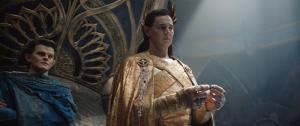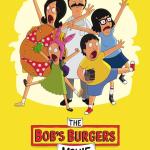As the internet suspected (multiple spoilers throughout this review), the season finale of Rings of Power has confirmed that Halbrand was in fact Sauron. We still don’t know who the stranger is, but they’re pretty heavily hinted that he’s Gandalf (though I’m still pulling for Tom Bombadil). We don’t see anything from Durin or about Isildur or Adar in this episode, and we see very little of what’s going on back in Numenor. Instead the episode focuses on Elrond, Galadriel, and Halbrand/Sauron, with a bit of the Hobbits and the Stranger thrown in.

To the writers’ credit, Rings of Power actually does manage to wrap up a few things here and there. The biggest thing of course is the big reveal that Halbrand is Sauron. With his help (but before they know that he’s Sauron), the elves manage to find a way to use the tiny bit of mithril they’ve got to make the rings that will save the elves from the disease eating away at them (and their trees? I’m unclear if it was just eating their elf tree, or if the disease was attacking all of Middle Earth but it was slow-moving so it didn’t affect things that didn’t functionally live forever–like elves and trees).
This is an interesting take on the purpose of the rings the elves wear. It’s been a minute since I’ve read the books and I don’t remember what specific function the elven rings served other than to enable them to resist Sauron. I know it wasn’t to cure disease, but I don’t remember the specifics. It seems that the writers were trying to think of a reason both to have the rings, have the elves want to wear them, and have them eventually kind-of spread throughout Middle Earth (further spoiler: Elrond, Galadriel, and Gandalf end up with them–though Gandalf’s was on loan from Cirdan). I suspect the long-term goal will be to establish that the rings have to be spread out to keep the disease at bay all over Middle Earth, and that most of the elves will have to stay close to them most of the time. Hence Rivendell and Lothlorien in later canon.
The other interesting tidbit in this show is how Sauron is portrayed. Again, it’s been a while since I’ve read the books but they actually do a good job of leaving it open-ended as to whether Sauron is actively planning events, or taking advantage of opportunities that come his way. When confronted by Galadriel, Sauron points out that he hasn’t really done anything–they dragged him to Numenor, then dragged him back to Middle Earth, and then dragged him into battle all while insisting that he was the ‘true’ king of the Southlands (which he repeatedly denied). I’d have to go back and rewatch to see how much of what he says is accurate and how much is creative retconning on Sauron’s part, but it’s still a clever way to present Sauron and not completely out of line with how evil works in the real world. Yes, there are times when sin is planning and clever and aggressively manipulates others in pursuit of its goals. But there are other times when sin just takes advantage of opportunities that arise. Again, there’s some mildly interesting stuff here.
And in all of this I’m ignoring the possibility that Sauron was genuinely supposed to be repentant, or at least trying to just live a quiet life in Numenor. It may very well be that the writers intended that, but if so they clearly didn’t know how to write that well or follow through…
Enough rambling. What’s the big takeaway–is Rings of Power worth your time? Well, as I said in an earlier review, there’s much to be admired about it. Certainly Amazon has thrown plenty of money it’s way, and the technical production value is solid. Likewise the acting is decent and the insertion of contemporary sensibilities over Tolkien’s vision has been nil (so far, anyway).
But also as I said in an earlier review, it’s clearly not the same quality as either Lord of the Rings itself or the Peter Jackson movies. (It’s maybe a bit better than the animated films from the 70s or the Hobbit movies, but the less said about those the better.) And to repeat myself a third time: if you had closed Lord of the Rings on me after two hundred pages and told me that I wouldn’t get to read any more, we would have to fight. And if after the end of the Fellowship of the Ring you had told me that the studio had canceled the other films, I’d have been more than willing to picket the CEO’s house. If tomorrow Amazon announces that there will be no more Rings of Power and that they’re removing Season 1 from streaming platforms, I’d shrug my shoulders and go on with life.
All that to say, it’s a decent enough show but Season 1 doesn’t really capture the magic or wonder or drama that we should expect from Middle Earth. And it’s probably more a reflection on our own times than anything else that we can’t successfully do today what was done twenty years ago. The world has moved on and gotten worse in doing so. And that may be the most Tolkienian aspect of the whole Rings of Power project: it simply can’t or won’t live up to the heights achieved by its predecessors.
Dr. Coyle Neal is co-host of the City of Man Podcast an Amazon Associate (which is linked in this blog), and an Associate Professor of Political Science at Southwest Baptist University in Bolivar, MO













